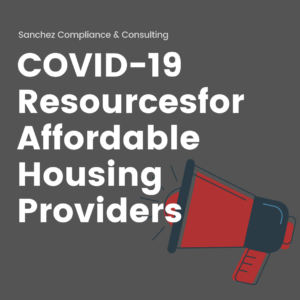Everything in the world changed almost overnight. One day we were all trying to get through spring break with our kids, and the next we were homeschooling them while navigating a new world. Needless to say, policies changed just as quickly for apartment managers.
Affordable housing compliance has always been a critical component of managing multifamily properties. However, it becomes challenging to keep up when new regulations are being passed almost daily.
How the Government is Responding to COVID-19
Affordable housing compliance standards are changing at the local, state, and federal levels. That means property managers need to stay on top of multiple ordinances.
Here’s how the government is responding to COVID-19 at different levels:
- Federal: The CARES Act provided funding for Section 8 project-based properties, Section 202 Supportive Housing for the Elderly properties, and Section 811 Supportive Housing for Persons with Disabilities properties.
- State: Every state is approaching the coronavirus pandemic differently. The Texas Department of Housing and Community Affairs isn’t enforcing penalties, accelerations, or foreclosures through the end of May to provide economic relief.
- Local: While following federal and state affordable housing compliance standards, many local governments are also offering financial assistance. The city of San Antonio recently approved a stimulus package to offer help to qualifying residents.
Some of these regulations provide flexibility for multifamily property managers while others are being implemented at the state level to protect residents.
3 Affordable Housing Compliance Standards Property Managers Will Need to Adopt
Even as retail businesses and local restaurants start opening back up, there is still a lot changing in the United States. Affordable housing compliance standards will need to be updated to reflect the current rental climate.
1. Late Payment Policies
Before COVID-19, many apartment complexes had the luxury of requiring rent payments in full. If someone couldn’t make the rent, you could evict them and have someone ready to move in tomorrow.
Now, many apartment complexes are looking at ways to circumvent the standard policies from the Texas Apartment Association, like waiving late fees and offering installment plans for rent payments.
2. Occupancy Guidelines
The CARES Act was written to cover an extensive selection of multifamily properties. This means apartment complexes that meet certain occupancy guidelines can qualify for mortgage forbearance.
To qualify for deferments, multifamily properties need to have federally backed mortgage loans or offer other types of low-income housing, housing for people with disabilities, or housing for the elderly.
3. Eviction Notices
The most significant affordable housing compliance change is how evictions are handled. Previously, you could initiate the eviction process to a late payer on the day after rent is due – that’s not the case right now.
We’ve noticed that eviction moratoriums vary widely. The federal government placed a hold on them for 120 days starting at the end of March, but cities like Austin have an extension in place until July.
How to Implement Affordable Housing Compliance
We know how hard it is to follow affordable housing compliance standards as they are constantly changing. Implementing them can be an even greater challenge. Affordable housing compliance companies put together comprehensive plans for multifamily properties.
Ready to upgrade your compliance standards? The team at Sanchez Compliance & Consulting can help you get started today.


